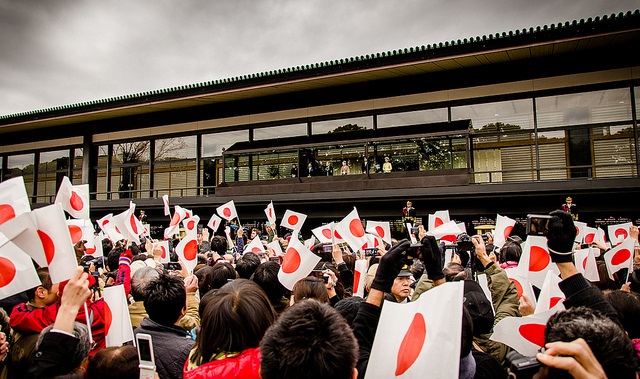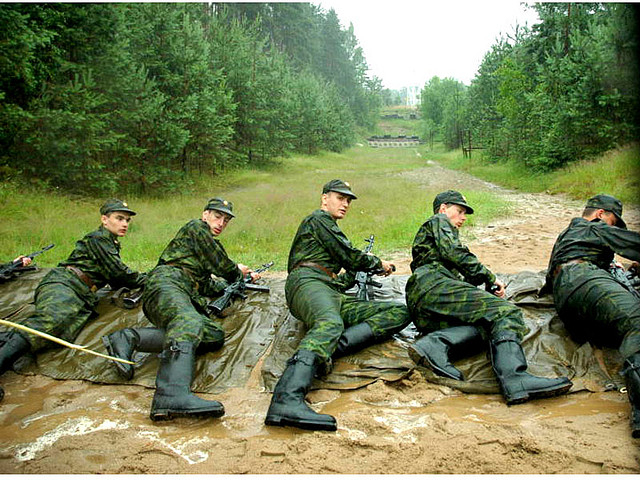The debate was about who knew Japan better: the “Japan Crowd” or the “Lobby,” on the right, or the “New Dealers” in the SCAP. The story of the US Occupation from, 1945 to 1952, is the story of these camps’ shared assumptions about the limitations of the Japanese psyche. In the end, the conservatives won, disproportionately influencing Japanese politics, and America’s imperial administration. (More…)
Author: Paul MutterPaul Mutter is a foreign policy blogger on leave from the NYU Arthur L. Carter Institute of Journalism. He contributes to PBS Tehran Bureau, The Arabist, Mondoweiss, Truthout, Salon and Foreign Policy in Focus. He primarily writes about US foreign relations, Israeli politics and the Persian Gulf region.
Paul Mutter is a foreign policy blogger on leave from the NYU Arthur L. Carter Institute of Journalism. He contributes to PBS Tehran Bureau, The Arabist, Mondoweiss, Truthout, Salon and Foreign Policy in Focus. He primarily writes about US foreign relations, Israeli politics and the Persian Gulf region.
In 1945, The Saturday Evening Post proudly proclaimed that “The G.I. Is Civilizing the Jap” by showing the “savage” and “dirty” natives how to fix cars without breaking them, and how to go to the bathroom. A 1951 follow-up subsequently reported that the Japanese they visited six year prior, with their nightsoil gardens and Shintoism, now had gas stoves and Christianity! (More…)
The Islamic State of Iraq and Syria (ISIS) and the Naqshbandi Army (an alliance of Ba’athists-cum-Islamists) took Mosul this week, and has advanced on Kirkuk and Tikrit, the latter being Saddam Hussein’s birthplace. Their offensive, which has sent 500,000 people fleeing northern Iraq and been a fiscal windfall for the group after it robbed city banks, was coordinated with other militias, but ISIS is the leading player. (More…)
What has ultimately determined how much, and to whom the U.S. extends aid is the potential leverage it affords over another country. Officials often justify sending main battle tanks, irrigation canal grants, and baby formula overseas to promote American values. (More…)
Last October, a Russian private military contractor, the Moran Security Group, shanghaied another PMC, the Slavonic Corps, by promising recruits $2,000-5,000 a month if they went to Syria to guard strategic facilities (military bases and power plants) to free up the regular Syrian Army guards for the front line. (More…)
President Lukashenko appealed to the apparatchiks. They were fearful of the literati calling for human rights reforms, and raising the divisive issue of whether or not Russian should be Belarus’ official language, an issue that rankles to this day. He also seemed to rise above the intrigues of the post-1989 legislature, with his anti-corruption agenda, though post-mortems of his first campaign show that it was light on actual investigations, but high on image management. (More…)
In a cartoon series about Eurozone asylum policies, a Greek is shown donning a blackshirt’s hat, Golden Dawn buckler, and club to beat two Africans to death – whom the other Eurozone countries refer to as pimples. Israel is showing putting up an umbrella to keep out a rain of migrants and refugees, who end up getting stuck next door, in Egypt. (More…)
According to Vittorio Longhi, Nepal sees “on average” two guest workers return in coffins to Kathmandu’s Tribhuvan International Airport every day. More than 7,000 Nepalese guest workers are known to have died on the job in the Middle East between 2003 and 2013 – over 700 in 2013 alone so far, according to The Kathmandu Post – from a combination of workplace injuries, natural causes, and traffic accidents. (More…)
Photographer Brandon Stanton’s Humans of New York project, which has spawned “Humans of” pages in many other locales – Dublin, Mumbai, Jerusalem and the Fiji Islands to name a few – began in 2010. Stanton had just left a career in the Chicago financial industry to move to New York, where he began walking around the city, taking street portraits. (More…)
You Can’t Be President, by Harper’s publisher John R. MacArthur is an epistolary analysis of exactly what that electoral process entails. The first line of the first chapter sets the tone: “Despite what you learn in school of in Junior Scholastic magazine, you can’t be President.” (More…)
Richard Clarke is concerned that Stuxnet, presumed to have been an Israeli-American initiative aimed at Iran’s nuclear program, is being studied by China to use against the U.S. “It got loose because there was a mistake,” he told Smithsonian Magazine. Clarke was angry, calling Stuxnet, “The best cyberweapon the United States has ever developed,” which it “gave the world for free.” (More…)
Propaganda may soon be returning to America’s airwaves. No, not the mainstream media liberals often deride as “Fox News” coverage. Nor the mainstream media Fox watchers deride as “liberal.” I mean honest-to-goodness propaganda, the kind that’s been legislatively limited in the United States since the end of World War Two. (More…)











